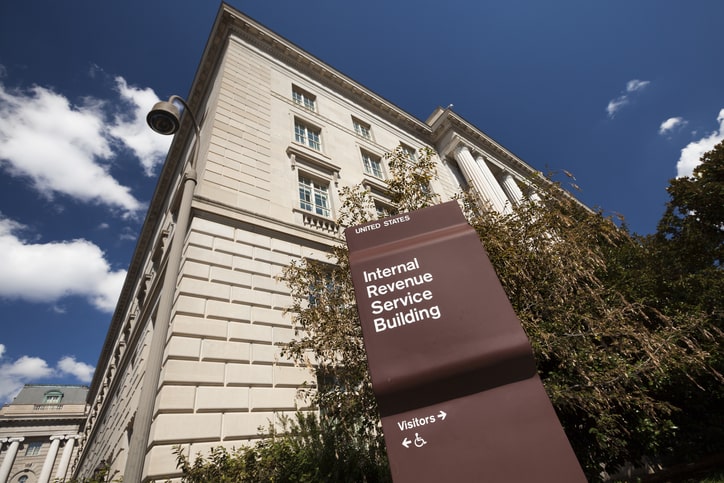The proposal to abolish the IRS has gained significant attention following President Trump’s announcement of the External Revenue Service (ERS) concept. This bold plan aims to eliminate the IRS entirely, replacing tax revenue with tariffs and duties collected from foreign sources. But how feasible is this idea? Can a century-old tax collection system truly be dismantled and rebuilt around international trade? This comprehensive analysis explores the possibilities, challenges, and implications of such a dramatic shift in America’s tax policy.

The Current State Of The IRS
The IRS stands as one of the most recognizable federal agencies in America, responsible for collecting approximately $3 trillion annually through income taxes. This massive revenue stream funds everything from national defense to social programs, infrastructure, and government operations. At LNB Accounting, we understand how these tax policies directly impact our clients’ financial situations and business operations.
Established in 1862, the Internal Revenue Service has evolved into a complex organization with nearly 80,000 employees. The agency processes over 240 million tax returns annually, examining millions of those returns and conducting thousands of audits. Despite its critical role in funding government operations, the IRS remains one of the least popular federal agencies among Americans.
Public frustration with the IRS stems from several factors. The complexity of the tax code creates confusion and compliance burdens for individuals and businesses alike. Many taxpayers spend hours preparing returns or pay professionals to manage the system on their behalf. Small business owners often cite tax compliance as one of their most significant administrative challenges.
This widespread dissatisfaction has fueled calls to abolish the IRS and replace it with something simpler. Critics argue that the current system is inefficient, invasive, and unnecessarily complex. These sentiments have made proposals to eliminate the IRS politically appealing to many Americans who feel overburdened by the current tax system.
The Proposed External Revenue Service (ERS)
Trump’s proposal for an External Revenue Service represents a radical departure from conventional tax reform ideas. Rather than merely simplifying the existing system, the concept aims to abolish the IRS entirely and shift the tax burden from domestic income to foreign trade.
The ERS would fundamentally change how the federal government generates revenue. Instead of collecting income taxes from American citizens and businesses, the new agency would focus exclusively on tariffs, duties, and other revenue from foreign sources. This approach aims to eliminate the need for Americans to file annual tax returns while simultaneously encouraging domestic manufacturing through import tariffs.
How would this differ from existing agencies? Currently, the U.S. Customs and Border Protection (CBP) already handles the collection of duties and tariffs on imported goods. As a federal law enforcement agency under the Department of Homeland Security, CBP’s mission encompasses safeguarding America’s borders, ensuring security, and regulating international trade.
The proposed ERS would likely expand upon CBP’s trade-related functions, focusing exclusively on revenue generation rather than CBP’s broader security mandate. This raises questions about potential duplication of efforts between the two agencies. Would the ERS absorb CBP’s revenue collection functions, or would the two agencies operate in parallel with overlapping responsibilities?
One critical distinction lies in the proposed scale of operations. While CBP currently collects tariffs as one of many functions, the ERS would need to generate enough revenue to replace the entire federal income tax, a dramatically larger scope than CBP’s current revenue operations.
Legal Framework For Abolishing The IRS
Can a president actually abolish the IRS? The short answer is no, at least not unilaterally. While the proposal to abolish the IRS makes for compelling campaign rhetoric, the constitutional reality is more complex.
The U.S. Constitution places the power of taxation squarely with Congress. Article I, Section 8 grants Congress the authority “to lay and collect taxes, duties, imposts, and excises.” This means any fundamental change to the tax system requires congressional action through formal legislation.
The president lacks the constitutional authority to create or eliminate major federal agencies without congressional approval. While presidents can reorganize certain executive functions through executive orders, abolishing an agency as significant as the IRS and creating a replacement would require new legislation passed by both houses of Congress and signed into law by the president.
The 16th Amendment, ratified in 1913, explicitly authorizes Congress to collect income taxes. Eliminating income taxation would not necessarily require repealing this amendment, but it would represent a dramatic departure from over a century of tax policy established under this constitutional framework.
Historical precedent suggests that major tax reforms generally take years to develop, debate, and implement. The Tax Cuts and Jobs Act of 2017, while significant, merely modified existing tax structures rather than replacing them entirely. A complete transition from income tax to tariff-based revenue would represent a far more sweeping change, likely requiring extensive transition periods to implement effectively.
For the proposal to abolish the IRS to become reality, it would need strong congressional support, particularly in both the House and Senate. This presents a significant political hurdle, especially in a closely divided Congress where major policy changes face intense scrutiny.
Economic Implications Of Replacing Income Tax With Tariffs
The economic challenges of replacing income tax revenue with tariffs represent perhaps the most significant obstacle to the feasibility of IRS abolishment. The scale of the replacement needed is staggering. Approximately $3 trillion in annual revenue is currently generated through income taxes.
To replace this revenue solely through tariffs would require dramatic increases in the rates applied to imported goods. Economists estimate that tariffs would need to reach at least 100% on all imported goods to generate comparable revenue. For context, most current U.S. tariffs range from 0-25%, with higher rates generally applied only in trade disputes or to specific products.
Such high tariff rates would significantly impact consumer prices. Virtually all imported goods-from electronics and clothing to automobiles and industrial equipment would see their prices double. This price shock would create substantial inflation, reducing purchasing power for American households and potentially triggering a significant economic contraction.
Businesses relying on imported components or materials would face difficult choices: absorb higher costs (reducing profits), pass costs to consumers (reducing sales), or seek domestic alternatives (which may not exist or may cost more). Many companies would struggle to adapt quickly to such dramatic changes in their cost structures.
International trade partners would likely respond with retaliatory tariffs on U.S. exports, further complicating the economic picture. Historical examples, such as the Smoot-Hawley Tariff Act of 1930, demonstrate how high tariffs can trigger trade wars that harm all participating economies. Modern global supply chains are even more integrated than in previous eras, making disruptions potentially more damaging.
Another complication arises from the stated goal of encouraging domestic manufacturing through tariffs. If successful, this policy would reduce imports over time as production shifts to the United States. While this might benefit American workers, it creates a paradox for revenue collection: as imports decrease, so too would the tariff revenue needed to fund government operations.
Potential Benefits Of Abolishing The IRS
Despite these challenges, supporters argue that abolishing the IRS could offer significant advantages. The most immediate benefit would be eliminating the need for most Americans to file annual tax returns. The average taxpayer spends approximately 13 hours preparing and filing their taxes each year, representing billions of hours of collective effort nationwide.
Businesses would no longer need to withhold income taxes from employee paychecks, potentially simplifying payroll administration. The resources currently dedicated to tax compliance, estimated at over $400 billion annually across the economy, could be redirected to more productive activities.
The proposed tariff-based system might also provide stronger incentives for domestic manufacturing. By making imported goods more expensive relative to American-made alternatives, the policy could encourage “reshoring” of production that has moved overseas in recent decades. This could potentially create manufacturing jobs in the United States, particularly in regions that have experienced industrial decline.
Supporters also argue that eliminating income taxes would increase take-home pay for American workers, potentially stimulating consumer spending and economic activity. Without income tax withholding, paychecks would be larger, though this benefit would need to be weighed against potential price increases on imported goods.
From a privacy perspective, IRS abolishment would reduce the amount of personal financial information collected by the federal government. Many taxpayers uncomfortable with the current level of financial disclosure might welcome this change, seeing it as increasing personal liberty and reducing government intrusion.
Challenges And Criticisms
Critics of the proposal to abolish the IRS through tariff replacement point to numerous practical and economic challenges. Revenue stability represents a primary concern. Income tax revenue, while fluctuating with economic conditions, provides relatively predictable government funding. Tariff revenue would be far more volatile, depending on trade volumes, exchange rates, and foreign policy developments.
Compliance with World Trade Organization (WTO) obligations presents another significant hurdle. The United States has committed to maximum tariff rates for thousands of products through WTO agreements. Dramatically increasing tariffs would likely violate these commitments, potentially triggering sanctioned retaliation from trading partners and undermining the rules-based trading system the U.S. helped establish.
Economic distortions could also emerge from such high tariff rates. Resources might flow to industries protected by tariffs rather than those where the U.S. has a comparative advantage, potentially reducing overall economic efficiency. Consumer choice would be restricted as imported goods become prohibitively expensive.
The regressive nature of tariffs raises equity concerns as well. Unlike income taxes, which can be structured progressively (higher rates on higher incomes), tariffs apply equally to all consumers regardless of income. This means lower-income households would likely bear a disproportionate burden of the new tax system, as they spend a larger percentage of their income on goods that would be subject to tariffs.
Transitional challenges would be enormous. The federal government, businesses, and individuals have built systems and expectations around income taxation for over a century. Dismantling this infrastructure while simultaneously building a new revenue system would create significant disruption and uncertainty.
Many economists have expressed skepticism about the feasibility of the proposal. Martin Feldstein, former chair of the Council of Economic Advisers, noted that “no modern economy has successfully funded a government of our size primarily through tariffs.” Other experts point out that the last time the U.S. relied primarily on tariffs for revenue was in the 19th century, when government spending represented a far smaller percentage of GDP.
Existing Models and Alternative Approaches
While the proposal to completely abolish the IRS in favor of tariffs has limited international precedents, examining alternative tax systems can provide useful context. Many countries have implemented different approaches to taxation that might offer insights for U.S. reform efforts.
Value-added tax (VAT) systems, common throughout Europe and much of the world, tax the value added at each stage of production. While still requiring administrative infrastructure, VAT systems can be simpler for consumers, who simply pay the tax included in purchase prices rather than filing annual returns. A VAT could potentially replace some income tax revenue while maintaining a domestic revenue source less disruptive to international trade than high tariffs.
Flat tax proposals suggest replacing the current progressive income tax with a single rate applied to all income above a certain threshold. supporters argue this would dramatically simplify compliance while maintaining domestic revenue generation. Critics worry about equity implications, as progressive taxation has historically helped reduce income inequality.
Some countries have experimented with territorial tax systems that only tax income earned within their borders. This approach differs from the U.S. system of taxing worldwide income of citizens and could represent a middle ground between complete elimination and the status quo.
Hybrid approaches might prove more feasible than complete replacement of income taxes with tariffs. For example, some tariff increases combined with simplified income tax filings and a modest VAT could potentially achieve many reform goals with less economic disruption.
The Fair Tax proposal, which has gained some support in Congress, would replace income taxes with a national sales tax. This consumption-based approach differs from tariffs by taxing all purchases equally, regardless of origin, avoiding some of the international trade complications of high import duties.
Incremental reforms to the current system could also address many taxpayer concerns without the disruption of complete replacement. Simplifying the tax code, expanding electronic filing options, and improving IRS customer service might deliver meaningful improvements while maintaining revenue stability.
Practical Considerations For Implementation
Implementing a plan to abolish the IRS would require addressing numerous practical considerations beyond the high-level policy debate. The transition period would be particularly challenging, requiring careful planning to maintain government operations while systems change.
Government agencies dependent on tax revenue would need assurances of continued funding during the transition. Bond markets and credit rating agencies would closely monitor the government’s ability to maintain revenue streams, influencing borrowing costs.
Businesses and individuals would require clear guidance on new compliance requirements, timelines, and responsibilities. The government would need to invest heavily in new infrastructure for tariff collection, enforcement, and dispute resolution.
Political opposition could slow or block implementation at multiple stages, especially if the economic consequences become apparent during the transition. Public opinion might shift as consumers face higher prices and economic uncertainty.
Conclusion
The idea to abolish the IRS and replace income tax revenue with tariffs is a bold and radical proposal that challenges over a century of American tax policy. While it offers potential benefits such as simplified tax compliance, increased privacy, and incentives for domestic manufacturing, the economic, legal, and practical hurdles are immense.
Replacing a $3 trillion income tax system with tariffs would require unprecedented tariff rates, likely causing inflation, economic disruption, and trade conflicts. The constitutional and legislative barriers mean that IRS abolishment cannot be achieved by executive action alone and would require broad congressional support.
Alternative tax reforms, including VATs, flat taxes, or national sales taxes, may offer more feasible paths to simplifying the tax system while maintaining revenue stability and economic balance.
Ultimately, the proposal to abolish the IRS sparks valuable debate about the future of taxation in America. However, the complexities involved suggest that any meaningful reform will require careful consideration, incremental steps, and bipartisan cooperation rather than sweeping, immediate change.
Contact us today for a consultation to discuss how potential tax reforms might impact your specific situation and develop strategies to protect your financial interests. Our experts stay current on all proposed tax legislation and can provide the clarity you need during uncertain times.
FAQs
Would abolishing the IRS affect my retirement accounts?
Yes. Current retirement accounts like 401(k)s and IRAs receive tax advantages under income tax laws. Eliminating income taxes would fundamentally change these incentives, potentially requiring new structures to encourage retirement saving. Existing accounts would likely need grandfathering provisions or transition rules.
How would eliminating the IRS affect state and local taxes?
State and local tax systems often rely on federal definitions and structures. Many states calculate income taxes starting with federal adjusted gross income. Abolishing federal income taxes would require states to either develop independent systems or adapt their revenue models. Property and sales taxes would be less directly affected.
How long would it take to abolish the IRS if approved?
Even with congressional approval, transitioning from income taxation to tariff-based revenue would likely take several years. The government would need to establish the new External Revenue Service, businesses would need time to adapt, and international agreements would require renegotiation. A phased approach over 3-5 years would be more feasible than an immediate switch.
Would Social Security and Medicare be affected by abolishing the IRS?
Currently, payroll taxes funding Social Security and Medicare are collected through the same system as income taxes. Abolishing the IRS would require creating new collection mechanisms for these programs or fundamentally restructuring their funding. This represents one of the most complex aspects of the proposal.
Would foreign companies still want to do business with the U.S. under high tariffs?
High tariffs would significantly change the economics of selling to U.S. markets. Some foreign companies might establish U.S. manufacturing to avoid tariffs, while others might reduce their American presence. The net effect would depend on the specific tariff rates, the uniqueness of products, and the size of the U.S. market for particular goods.
How would abolishing the IRS affect the average American’s finances?
Americans would no longer file income tax returns or have taxes withheld from paychecks, potentially increasing take-home pay. However, imported goods would become significantly more expensive due to tariffs. The net impact would vary based on income level, spending patterns, and employment sector. Those who spend more on imported goods might see their cost of living increase substantially.




